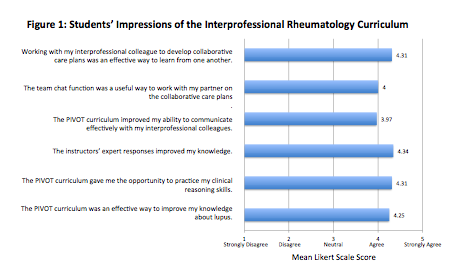Session Information
Session Type: ACR Concurrent Abstract Session
Session Time: 2:30PM-4:00PM
Background/Purpose:
The demand for rheumatologic care far exceeds the current supply of rheumatology providers, and this gap is expected to increase. Early exposure to rheumatology cases is an important way to inspire interest in our specialty among trainees in various health professions. The ability to work effectively in interprofessional (IP) teams is a critical skill for the next generation of rheumatology providers. We created a novel curriculum that A) provides health professions students with early exposure to illustrative rheumatology cases using an innovative patient simulation app, and B) allows students to practice collaborating in IP teams.
Methods: In this pilot curriculum, 16 medical students and 16 pharmacy students collaborated in pairs over the course of 2 weeks on a virtual patient case of a young woman with lupus. The case was presented using PIVOT (ÒPractice Improvement using Virtual Online TrainingÓ) – an interactive mobile app that allows students to review case content (i.e. videos of the patient interview, radiographic images, and lab results), refine their clinical reasoning skills (with tools such as the Òdifferential diagnosis sliderÓ which allows students to rank diagnoses in order of likelihood), and communicate with their teammate via mobile chat to formulate several IP Òcollaborative care plansÓ. The plans were graded for accuracy and completeness, and students were able to review expert plans written by faculty rheumatologists and pharmacists. At the end of the case, students completed a feedback survey that included both quantitative (Likert scale) and qualitative (open-text) assessment of the curriculum. We calculated descriptive statistics for the Likert scale data, and performed structured thematic analysis of the open-text data to identify common themes.
Results: All 16 interprofessional teams successfully completed the case and submitted 3 collaborative care plans. All 32 students completed the post-curriculum survey, and Likert scale scores are summarized in Figure 1. Thematic analysis of the open-text questions revealed that students particularly valued 1) the opportunity to learn from their medical/pharmacy teammateÕs unique approach to the case, 2) the Òteam chatÓ platform which allowed them to communicate with their teammate in real time, and 3) the opportunity to learn from faculty expert care plans.
Conclusion: We successfully developed a novel IP rheumatology curriculum for medical and pharmacy students using PIVOT, an interactive mobile application. The curriculum was well-received by the students, who reported that it improved their understanding of lupus as well as their ability to communicate effectively in IP teams. Based on the success of this pilot, we plan to utilize the PIVOT platform to develop additional rheumatology cases and to involve more health professional trainees, including nursing and physical therapy students.
To cite this abstract in AMA style:
Mandal J, Dall'Era M, Andreatta S, Floren L. An Interactive Rheumatology Curriculum for Interprofessional Teams Using a Novel Mobile App [abstract]. Arthritis Rheumatol. 2018; 70 (suppl 9). https://acrabstracts.org/abstract/an-interactive-rheumatology-curriculum-for-interprofessional-teams-using-a-novel-mobile-app/. Accessed .« Back to 2018 ACR/ARHP Annual Meeting
ACR Meeting Abstracts - https://acrabstracts.org/abstract/an-interactive-rheumatology-curriculum-for-interprofessional-teams-using-a-novel-mobile-app/

